We’ve explored themes, literary devices and characters and development amongst other things over on our After Darkness by Christine Piper blog post. If you need a quick refresher or you’re new to studying this text, I highly recommend checking it out!
Here, we’ll be breaking down an After Darkness essay topic using LSG’s THINK and EXECUTE strategy, a technique to help you write better VCE essays. If you’re unfamiliar with this strategy, you can learn about it in our How To Write A Killer Text Response study guide.
Within the THINK strategy, we have 3 steps, or ABC. These ABC components are:
Step 1: Analyse
Step 2: Brainstorm
Step 3: Create a Plan
Let’s get into it!
The Prompt:
‘While Ibaraki clearly suffers the consequences of his actions, it is those closest to him who pay the highest price. Discuss.’
THINK
Step 1: Analyse
This is a theme-based prompt, and the keywords are: suffer, consequence, actions and highest price. You want to explore both the evidence that supports the statement and also any evidence that may offer a contradiction to the statement.
From here you can find the definition of the keywords to help develop some questions to explore.
Step 2: Brainstorm
To suffer is to be affected by or subject to something unpleasant.
- Is Ibaraki the only one who suffers? Who else suffers?
Kayoko, Johnny, Stan, Sister Bernice. - How do characters deal with their suffering differently?
Kayoko and Sister Bernice abandon their relationships with Ibaraki, Johnny becomes agitated and spiteful, Stan becomes depressed.
A consequence is a result of an action.
- Are the consequences negative or positive?
Johnny being outspoken in the internment camp angers the traditionalist Japanese, but creates a sense of kinship amongst the half-blood Japanese. - Can characters overcome these consequences or learn from them?
Ibaraki eventually learns from his mistakes and grows as a result.
An action is the process of doing something, typically to achieve an aim.
- Is it Ibaraki’s actions, or lack thereof that lead to consequences?
It is often his silence and obedience that cause trouble. For example, not telling Kayoko about his work leads to the failure of their marriage. - Is it only Ibaraki who makes mistakes?
Sister Bernice ignores her religion to confess her love for Ibaraki. - What are the factors that cause the characters to act in the way that they do?
Ibaraki’s guilt and fear of authority and judgement prevent him from speaking up on multiple occasions.
Highest price refers to Ibaraki’s suffering being above all else.
- Is this true?
Ibaraki loses his dignity, his friends, his wife, his unborn child, his family, his job and his freedom. However, he does partially regain these. - Who suffers the most?
Kayoko has a miscarriage and her marriage to Ibaraki fails. Stan is assaulted by other internees and is eventually killed by a guard. Johnny becomes an outcast in his community and is bullied by other internees.
At this point, you can begin to group your ideas and evidence from the text to support your claims.
Throughout the novel, Piper uses a variety of literary devices including dialogue, simile and foreshadowing to convey her message of every action having a consequence. The most prominent of these is her use of imagery and metaphor which she uses to illustrate Ibaraki’s guilt and the way it impacts his actions. However, the story is not only centred around Ibaraki. Piper also highlights that people will often face consequences no matter what decision they make. She does this through her use of foil characters (characters who are used to highlight a particular trait in another character). For example, Ibaraki’s fear and obedience are emphasised by the courage of Kayoko and Johnny Chang. These characters, alongside Ibaraki, face suffering as a result of their actions.
From these ideas, the main themes I am going to explore are what factors affect the character’s actions, and how the consequences of these actions can lead to negative, but also positive change.
Step 3: Create a Plan
Paragraph 1:
- Whilst the novel centres around Ibaraki’s actions and their consequences, he is not the only character that makes mistakes and is forced to face the repercussions.
Paragraph 2:
- It is not necessarily Ibaraki’s actions, but lack of action that often results in the suffering of those around him. Consider the reasons for his lack of action: his blind devotion to authority, his fear of judgement, his ongoing guilt and regret from previous situations.
- Ibaraki’s lack of action acts as a perpetuating factor for the suffering of those closest to him, but it is not the only factor.
Paragraph 3:
- Ibaraki may pay the highest price for his actions. The structure of the storyline to include a chapter from Ibaraki’s perspective years later indicates that these consequences have ultimately led to positive change.
EXECUTE
Now it is time to write the essay!
Set during the Pacific War, Christine Piper’s After Darkness explores the difficulties and misfortunes many face during wartime. Depicting the rise and fall of Japan’s war efforts (1), After Darkness highlights that all actions have consequences of varying severity, particularly those of protagonist Dr Ibaraki Tomokazu. Throughout the novel, Ibaraki’s lack of action perpetuates the suffering of those closest to him, however, this is shown to be one of many factors and often initiates positive change within him, allowing his character to develop. Fundamentally, After Darkness highlights that change can only occur if people face the repercussions of their actions. (2)
Annotations
(1) In the introduction, it is important to introduce the text with context. As After Darkness is predominantly set in 1942 during wartime in both Japan and Australia, it is important to include this in the introduction in order to explore the essay topic with a complete understanding.
(2) Another key part of the introduction is to briefly introduce the topics you will discuss throughout the essay.
Throughout the novel, Piper emphasises the idea that all actions have consequences, however, this idea is not limited to Ibaraki. Across the three novel strands, protagonist Dr Tomokazu Ibaraki’s suffering as a result of his mistakes is depicted through both his internal and external dialogue. Ibaraki makes many significant mistakes throughout his lifetime, one of these being his failure to perform a dissection of a child when working at Unit 731. Despite ‘not [being] [him]self’ (3) when asked to perform the operation, Ibaraki is promptly fired. His termination of employment is not the only consequence of his failure, as shame continues to take over his confidence. This is illustrated when he was ‘unable to go on’ during an operation in Broome, despite being in a completely different scenario. Through Ibaraki’s flashback of ‘Black dots on a child’s belly’, Piper indicates the torment and lasting effects of consequences on an individual (4). Whilst the novel centres around his mistakes, it is revealed that Ibaraki is not the only character who is forced to face the repercussions of their actions. Despite acting as foils for Ibaraki and presenting many different qualities, Australian internees Johnny Chang and Stan Suzuki also struggle immensely to overcome the results of their behaviours. Johnny Chang’s outspoken nature is often shown to cause disruption among the camp, for example, labelling the imperialist Japanese as ‘emperor worshipping pig’s.’ In standing for his beliefs, Johnny creates a tense division within groups, leading to the half Australian internees being treated like ‘outcasts’. Conversely, Stan’s introverted behaviour results in his eventual death (5). Piper’s contention that all actions have consequences is arguably enforced strongly through Stan’s death, as it results from the failure of many characters to act. Ibaraki’s inability to open up, Johnny’s selfishness and Stan’s loss of self are inevitably all factors leading to his eventual demise. This is ultimately reinforced when Johnny states ‘It should’ve been me Doc’, indicating he has finally realised his role in the tragedy.
Annotations
(3) In order to embed quotes, words, prefixes and suffixes can be added to ensure the sentence flows correctly. However, you must indicate that you have edited the quote by placing your changes in square brackets. Here, the original quote was ‘not myself’ but it has been changed to fit the sentence.
(4) Whilst it is important to include quotes, it is even more important that you analyse how the author uses the quote to convey a message. In this case, the example of one of Ibaraki’s many flashbacks is used to bear Piper’s belief that one cannot escape the repercussions of their actions.
(5) Comparison is a powerful way of exploring the author’s ideas throughout the text. Here, Johnny’s outspoken nature is contrasted with Stan’s ‘introverted behaviour’, yet both concede repercussions. This supports the idea that all actions have consequences, no matter their nature.
Ibaraki’s lack of action acts as a perpetuating factor for the suffering of those closest to him, however, it is not the only factor. After Darkness shows the faults in many of Ibaraki’s actions, suggesting his mistakes lead to the misfortunes of many of those around him but this is only partially true. Stan Suzuki’s death is a pivotal moment in the novel where Ibaraki begins to truly express his emotions and open up about the pain he feels (6). Ibaraki realises that he ‘could have done something’ when opening up to the investigators of Stan’s death, leading to the conclusion that Ibaraki is to blame. Piper illustrates that suffering results as a combination of factors through the later revelations of Johnny’s escape attempt and the instability of the ‘trigger-happy’ guard who shot Stan. This idea is reinforced through the breakdowns of Ibaraki’s close relationships with Kayoko and Sister Bernice. Whilst Ibaraki’s emotionally distant nature catalysed the loss of these significant relationships, it was not the only factor. Both Kayoko and Sister Bernice are structured with similar characteristics in the novel, one being their confidence and strength in their beliefs. Nevertheless, both women lack this characteristic when it comes to their relationship with Ibaraki (7). Ibaraki admits his separation from Kayoko is his ‘greatest regret’, and whilst the first-person perspective does not give an insight into Kayoko’s side, she is shown to lack her usual self-assuredness. Similarly, Ibaraki’s allowance of ‘silence [to] stretch between…’ him and Sister Bernice is hurtful and a failure on his behalf, yet she still willingly confesses her feelings, aware of the risks involved. This is evident when ‘her eyes dart away from [his]’, implying she is ashamed of her statement as it contradicts her religion and the terms of their work relationship and friendship. This results in an abrupt end to their friendship as the embarrassment of the repercussions of her actions overwhelm Sister Bernice. Whilst the series of mistakes that Ibaraki makes throughout the novel show that his actions cause grief for both him and the people around him, they also highlight that the misfortune of others is not always the fault of one individual.
Annotations
(6) Referring to specific events in the text is extremely useful to support your ideas and claims. However, it is important that you avoid over-explaining the event, as this will lead to you retelling, rather than analysing the text. See How To Avoid Retelling the Story for more tips.
(7) An often-overlooked literary device is the use of foils. A foil is a character that is used to highlight a particular trait in another character, often a flaw. In this case, Piper uses the similarities between Kayoko and Sister Bernice, and the ultimate failure of their relationships. This highlights Ibaraki’s repetition of his mistakes, which we can attribute to his ongoing guilt.
Ibaraki ultimately pays the highest price for his actions; although this is shown to result in positive change. Through her descriptions of Australia and Japan, Piper uses the juxtaposition of light and dark imagery to illustrate how suffering can lead to learning and growth. Facing racism in Broome when labelled as a ‘Bloody Jap…’, trauma from his experiences in Unit 731 and hardship during his internment at Loveday, Ibaraki is constantly a victim of circumstance. Even so, the pressures and torment of these events force him to seek the support of others. The colourful descriptions of the ‘pink spur of land crested with green’ foreshadow the positive change to come for Ibaraki (8). This becomes evident when Ibaraki finally opens up to Stan in the infirmary about his separation from Kayoko. Ibaraki’s development as a character continues as he learns to trust despite the unfair circumstances of being interned. Although memories of trees haunting the river’s edge ‘like lost people’ and the bark of red trees appearing ‘like blistered skin’ continue to plague Ibaraki’s conscience, they force him to confront his past and in turn begin to heal. Through the retrospective novel, Piper describes Japan as where ‘darkness crowded the corners’ and Ibaraki worked ‘in the basement’, indicating his misguided obedience and attachment to silence. This not only illustrates (9) Ibaraki’s trauma, but emphasises his drastic development through his experiences. The importance of the consequences Ibaraki has faced throughout his lifetime are reinforced in the final pages of the novel after he reads Sister Bernice’s letter and has an epiphany. The discovery that he had ‘clung to the ideal of discretion’ creates a sense of hope for Ibaraki’s future and emphasises his newfound understanding of life through the consequences he has faced. (10)
Annotations
(8) Ensure you don’t just randomly place quotes throughout the essay, but instead, analyse them to give them meaning. An easy way to do this is by including the quote, its connotations and what emotions or ideas they provoke, followed by why the author has used it. In this case, the quote was the ‘pink spur of land crested with green.’ Its connotations were positive such as colour, happiness, and hope. These connotations were used to foreshadow positive change.
(9) Using a variety of vocabulary such as ‘illustrates’, ‘explores’ and ‘demonstrates’ shows that you are not only identifying what the author is doing but that you understand how and why they have done it in this way. This is ultimately the goal of a text response essay.
(10) It is important to ensure the flow of your essay to show sophistication in your writing. It is not only the ideas you have, but the way in which you convey and explain them that ultimately indicates your understanding of the text. A simple way to do this is to use a summary sentence at the end of each topic that subscribes to the idea and links to the previous or following paragraph.
Essentially After Darkness highlights the necessity of facing consequences for our actions to promote learning and growth. Whilst Ibaraki and many other characters suffered as a result of their behaviour, Piper asserts that Ibaraki is not the overall perpetrator but ultimately pays the highest price of all. (11)
Annotations
(11) Just like the introduction, the conclusion is a brief summary of the discussion topics throughout your text response. Most importantly, after exploring all of the evidence you must form a stance in relation to the essay topic. Many students believe that this needs to be a simple and definite yes or no, which is not the case. Instead, I have suggested that Ibaraki is not the only one to blame for other character’s suffering, but that ultimately, he paid the highest price. Check out 5 Tips for a Mic-Drop Worthy Essay Conclusion if you need more help finishing your essay off with a bang!
If you found this essay breakdown helpful, then you might want to check out our After Darkness Study Guide which includes 5 A+ sample essays with EVERY essay annotated and broken down on HOW and WHY these essays achieved A+ so you reach your English goals!
---
After Darkness is usually studied in the Australian curriculum under Area of Study 1 - Text Response. For a detailed guide on Text Response, check out our Ultimate Guide to VCE Text Response.





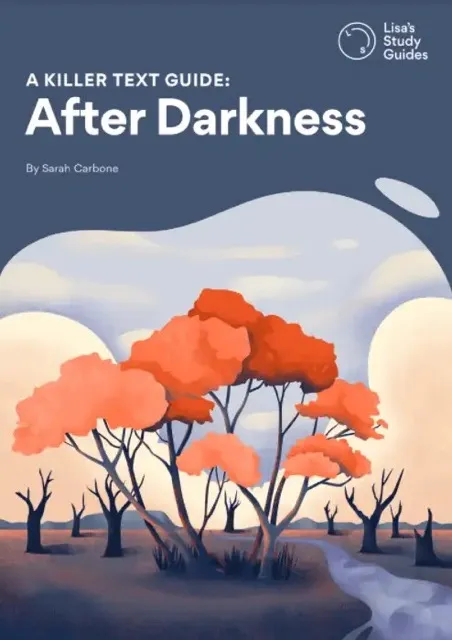
.webp)
.webp)
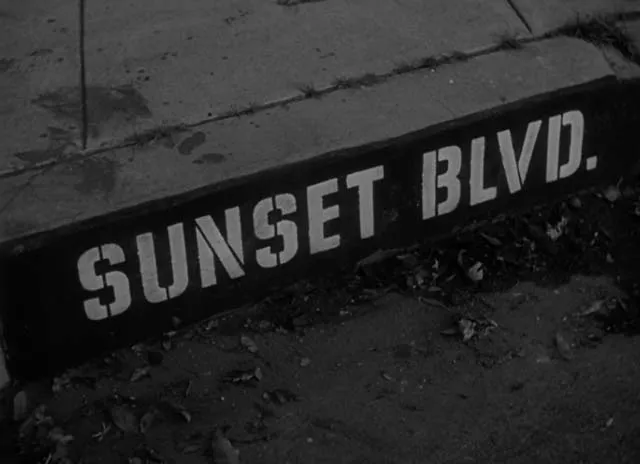
.webp)
.webp)
.webp)
.webp)
.webp)
.webp)
.webp)
.webp)
.webp)
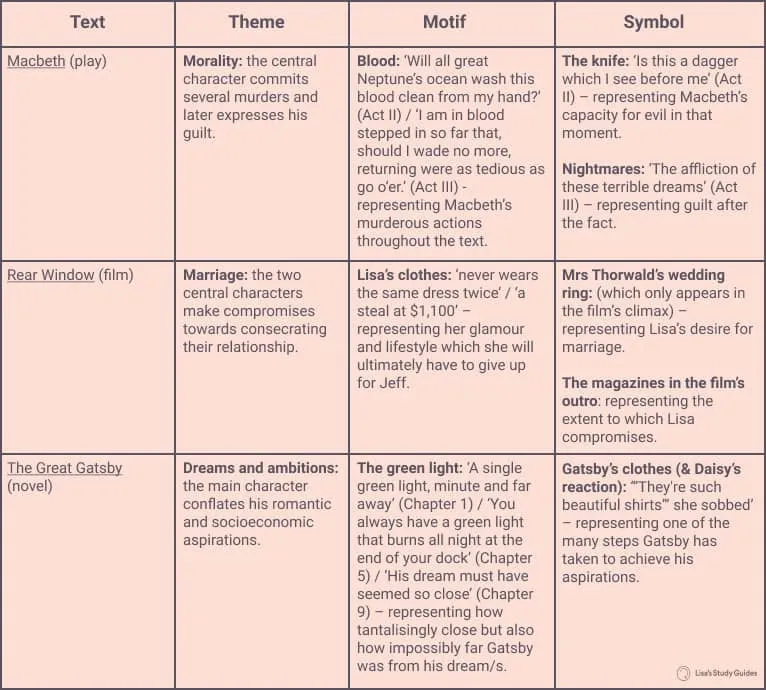
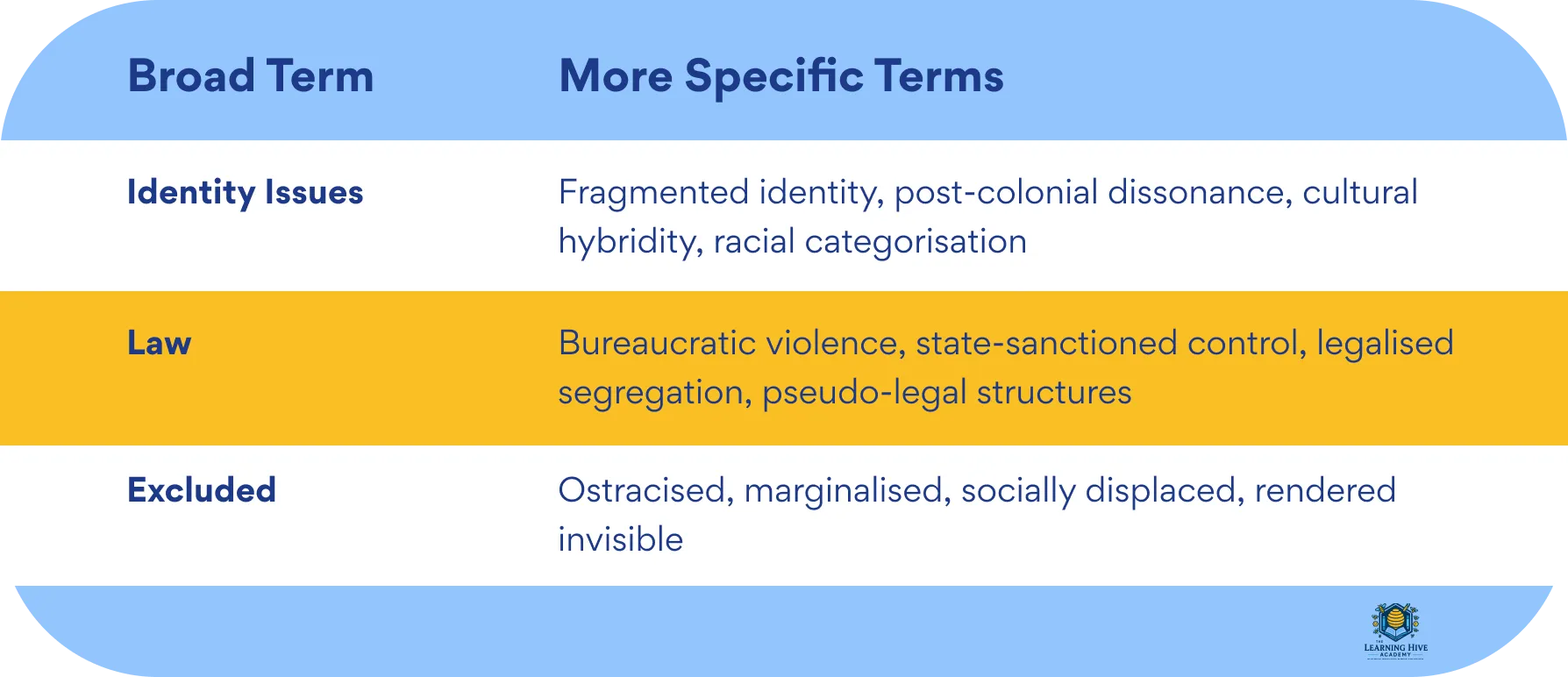


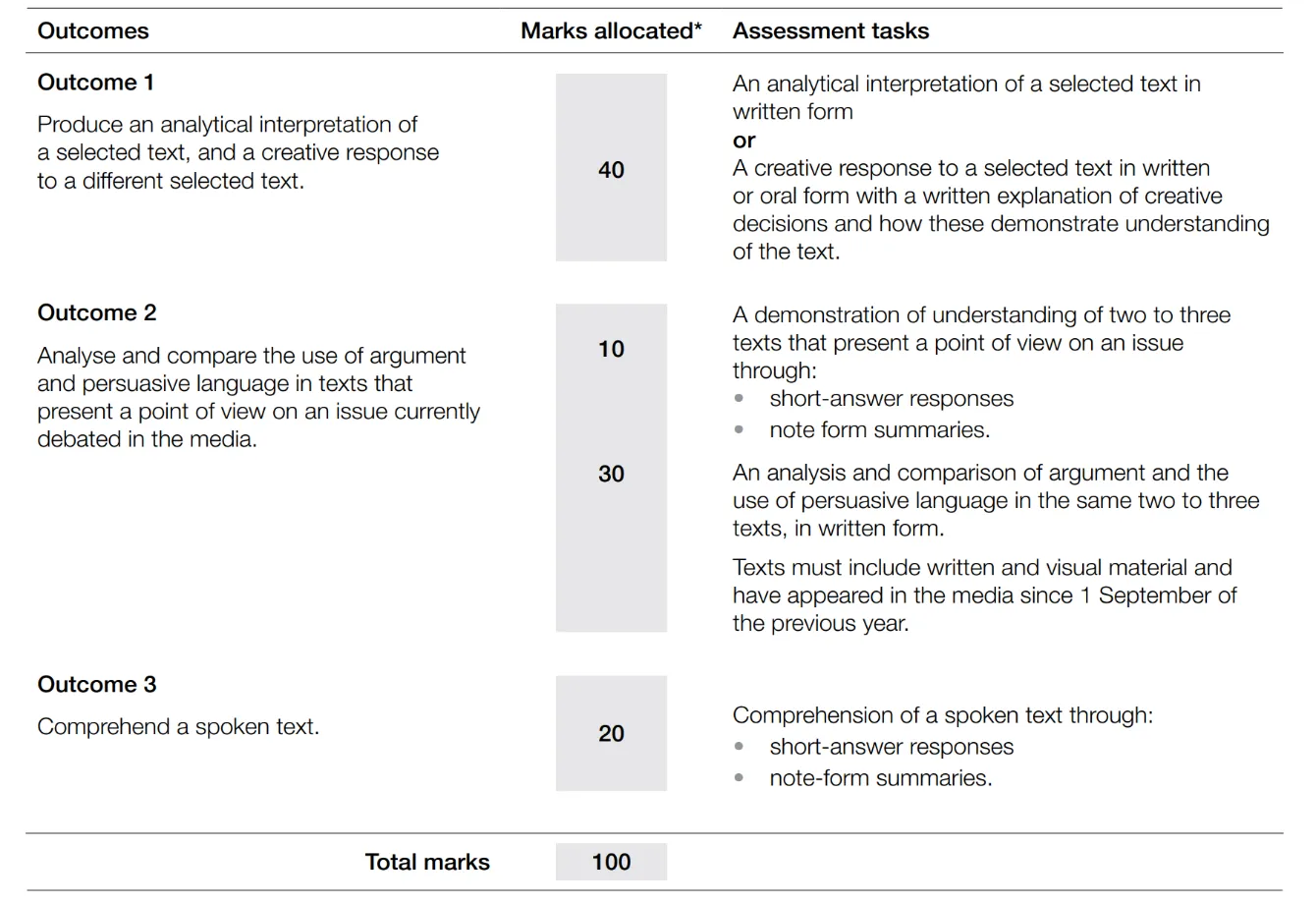

.jpg)